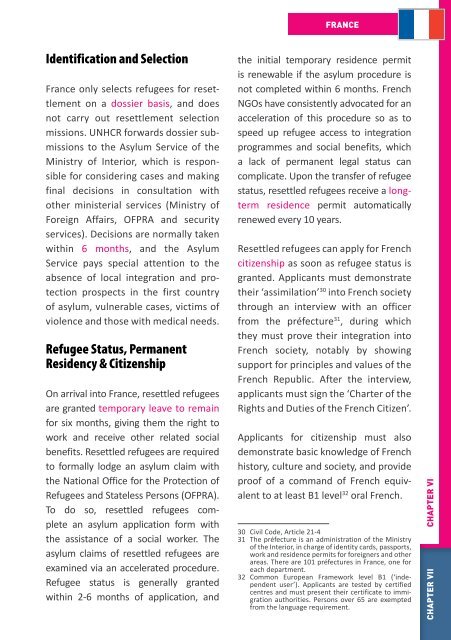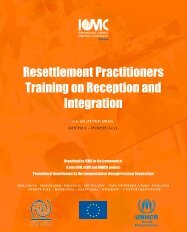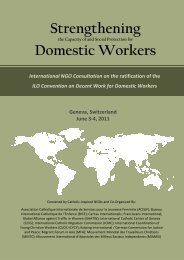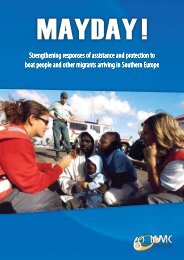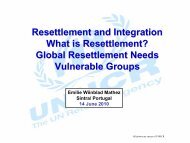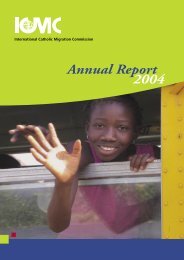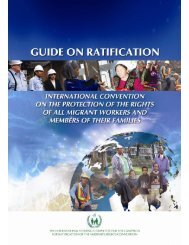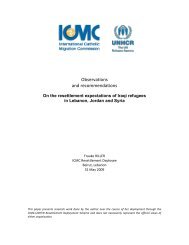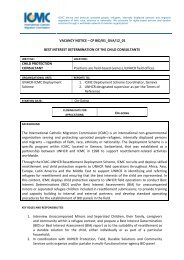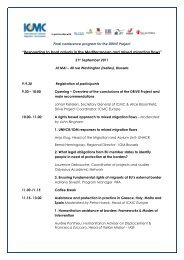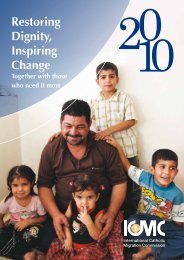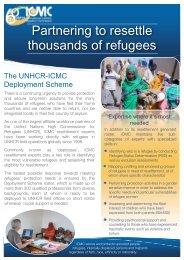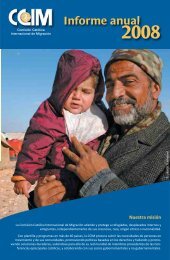ICMCEUROPE WelcometoEurope.pdf (5.89 MB)
ICMCEUROPE WelcometoEurope.pdf (5.89 MB)
ICMCEUROPE WelcometoEurope.pdf (5.89 MB)
Create successful ePaper yourself
Turn your PDF publications into a flip-book with our unique Google optimized e-Paper software.
France<br />
171<br />
Identification and Selection<br />
France only selects refugees for resettlement<br />
on a dossier basis, and does<br />
not carry out resettlement selection<br />
missions. UNHCR forwards dossier submissions<br />
to the Asylum Service of the<br />
Ministry of Interior, which is responsible<br />
for considering cases and making<br />
final decisions in consultation with<br />
other ministerial services (Ministry of<br />
Foreign Affairs, OFPRA and security<br />
services). Decisions are normally taken<br />
within 6 months, and the Asylum<br />
Service pays special attention to the<br />
absence of local integration and protection<br />
prospects in the first country<br />
of asylum, vulnerable cases, victims of<br />
violence and those with medical needs.<br />
Refugee Status, Permanent<br />
Residency & Citizenship<br />
On arrival into France, resettled refugees<br />
are granted temporary leave to remain<br />
for six months, giving them the right to<br />
work and receive other related social<br />
benefits. Resettled refugees are required<br />
to formally lodge an asylum claim with<br />
the National Office for the Protection of<br />
Refugees and Stateless Persons (OFPRA).<br />
To do so, resettled refugees complete<br />
an asylum application form with<br />
the assistance of a social worker. The<br />
asylum claims of resettled refugees are<br />
examined via an accelerated procedure.<br />
Refugee status is generally granted<br />
within 2-6 months of application, and<br />
the initial temporary residence permit<br />
is renewable if the asylum procedure is<br />
not completed within 6 months. French<br />
NGOs have consistently advocated for an<br />
acceleration of this procedure so as to<br />
speed up refugee access to integration<br />
programmes and social benefits, which<br />
a lack of permanent legal status can<br />
complicate. Upon the transfer of refugee<br />
status, resettled refugees receive a longterm<br />
residence permit automatically<br />
renewed every 10 years.<br />
Resettled refugees can apply for French<br />
citizenship as soon as refugee status is<br />
granted. Applicants must demonstrate<br />
their ‘assimilation’ 30 into French society<br />
through an interview with an officer<br />
from the préfecture 31 , during which<br />
they must prove their integration into<br />
French society, notably by showing<br />
support for principles and values of the<br />
French Republic. After the interview,<br />
applicants must sign the ‘Charter of the<br />
Rights and Duties of the French Citizen’.<br />
Applicants for citizenship must also<br />
demonstrate basic knowledge of French<br />
history, culture and society, and provide<br />
proof of a command of French equivalent<br />
to at least B1 level 32 oral French.<br />
30 Civil Code, Article 21-4<br />
31 The préfecture is an administration of the Ministry<br />
of the Interior, in charge of identity cards, passports,<br />
work and residence permits for foreigners and other<br />
areas. There are 101 préfectures in France, one for<br />
each department.<br />
32 Common European Framework level B1 (‘independent<br />
user’). Applicants are tested by certified<br />
centres and must present their certificate to immigration<br />
authorities. Persons over 65 are exempted<br />
from the language requirement.<br />
CHAPTER VI<br />
CHAPTER VII


